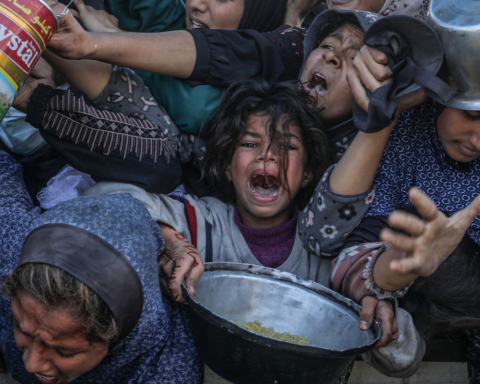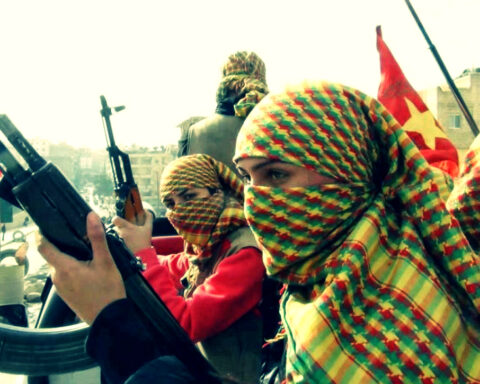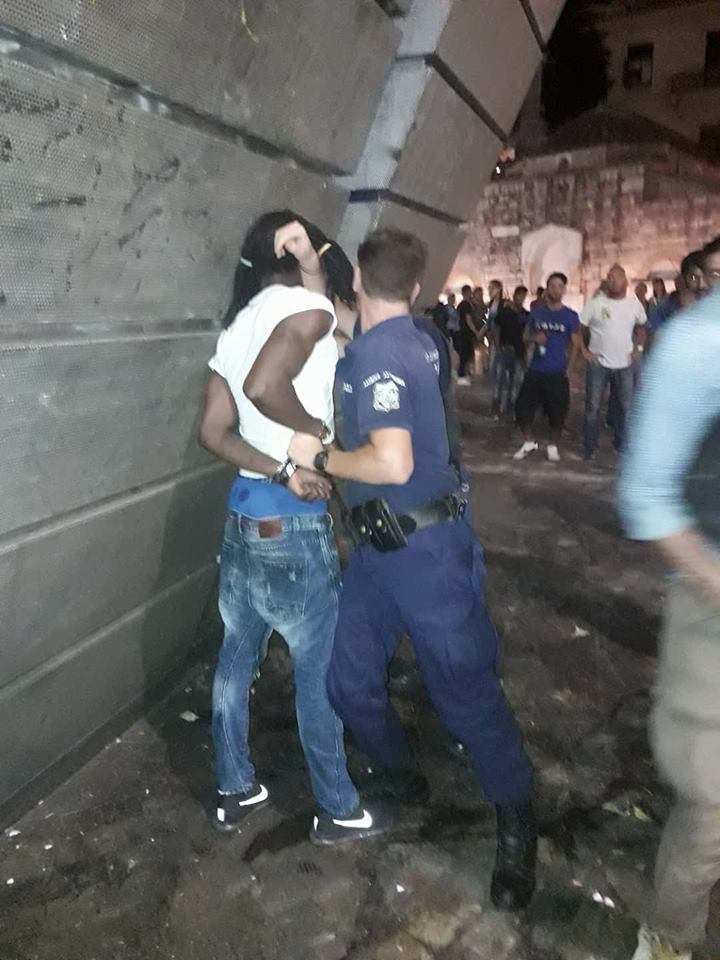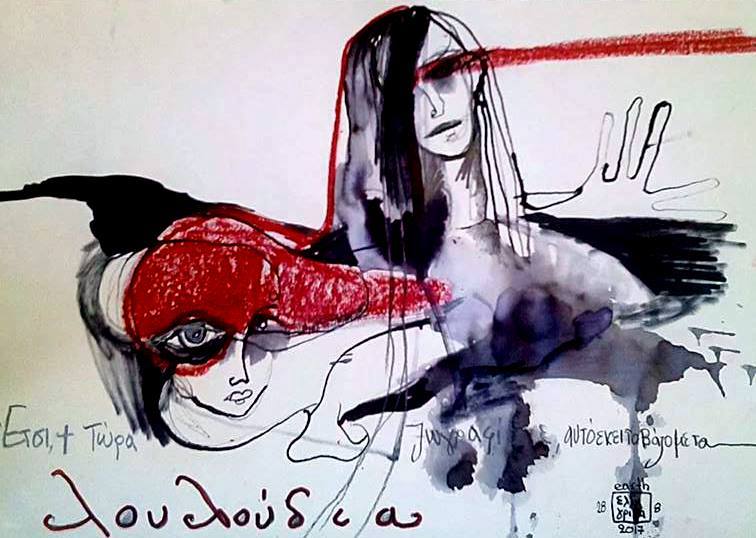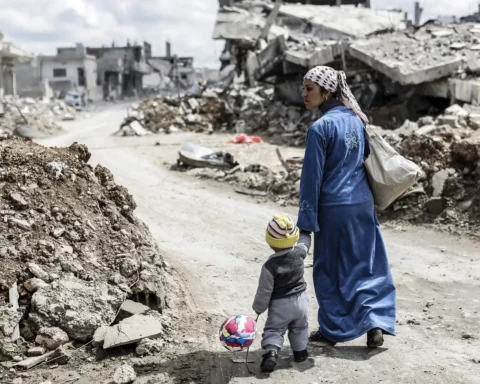Refugees face brutal miseries. When we talked to some of Rohingya refugees, they have revealed more painful truths about the refugee crisis and the atrocities encountered by them by their homeland rulers and their mango-twigs.
“You never let a serious crisis go to waste. And what I mean by that it’s an opportunity to do things you think you could not do before.” Rahm Emanuel
article written by Anwar A. Khan / Sri Lanka Guardian
German Chancellor Angela Merkel has wonderfully dropped a line, “Every person who comes is a human being and has the right to be treated as such”, but where is the dignity of a small portion of minority population in the Rakhine state of Rohingya people in the country of Nobel laureate public figure like septuagenarian Aung San Suu Kyi? Rather, ill-usage on this very poor community has been continuing in time or space without interruption since long by her government and the military blackguards. Attaint, disgrace, dishonor and shame on them!
The title is at first glance an echo of Gianfranco Rosi’s magnificent refugee documentary study Fire at Sea: a film whose subtlety, complexity and depth I have to say go way beyond this. Actually, it is a quotation from Shakespeare’s drama titled, “The Tempest”, when Prospero tells Miranda the history of their “sea sorrow”, and how they came to be exiles on a remote island, far from Milan, the former seat of his power and prosperity. Redgrave stages a brief, powerful dramatised reading of the scene, with Prospero played by Ralph Fiennes. They are refugees, in their way, Redgrave is implying: people like us, white Europeans to whom we are naturally invited to extend sympathy and esteem. Another contemporary reading of “The Tempest” might be to imagine Caliban, the island’s indigenous inhabitant, harassed and demonised as a monster, getting into an inflatable and finally turning up in Milan as a refugee, demanding succour.
Refugees face brutal miseries. When we talked to some of Rohingya refugees, they have revealed more painful truths about the refugee crisis and the atrocities encountered by them by their homeland rulers and their mango-twigs. Rakhine refugee crisis now, is the biggest shame of humanity, which the Myanmar Government and its army is responsible for. Displacement affected my family: One time there was heavy firing on Rakhine area, so they had to leave everything and come to Bangladesh. The experience was horrible and very ugly according to them. It’s them and the detainees of course! I always think; imagine that you are living in a tent or a hut inside Bangladesh and you have zero hope of going back home or even back to live in a small house, this is how they feel. Every human on the face of earth should try to sleep in their own homeland. The refugees represent the full picture of the Rakhine Muslim crisis in Myanmar and they are the ones who are paying.
Our dream is to live in our own homeland… a country…the same country that is everyone’s simple right… we have a bigger dream that shadowed the majority of our smaller dreams.But They are now registered as either a refugee or without identity. We are seeing the Rakhine mother and her kids travelling alone to the unknown future without her husband, he might be killed or he is detained or kidnapped. They are leaving their destroyed house and their scattered memories in this long road to take shelter in Bangladesh. One refugee has said, “I am trying to tell the people whom live their lives in peace and dignity, freedom and safety to feel our pain and to help us to stand again for life.” Too many drowning accidents are happening as Rakhine refugees tried to escape the misery to find a better life.
Actually, it’s the Myanmar government’s fault in the first place, that have led them to such unreasonable decisions of fleeing by death trap boats. People will keep trying to get to Bangladesh, even under the risk of drowning, because they have lost everything. This piece is about how the camp or the tent in the refugees’ camps has become an aim or a huge dream to catch for those displaced. It’s just a long marathon to reach them. The most important thing about refugees is that there is no place to go back to. This is what this piece embodies. If you go the refugee camps, you would find the shattered lives of refugees. While many of us have a home to return to every day seeking shelter and security, countless others have been displaced from where they once belonged and surrendered to the merciless borders where they are looked upon as refugees. Maybe the word has been familiarised and normalised in our minds due to its abundant usage by world media outlets. However, only those suffering the atrocities by the Myanmar authorities and the sorrows of displacement know well the meaning of being a refugee and the weight of this widespread burden. We experienced the similar indescribable agonies in 1971 war when our ten million took shelter in India as refugees.
The wars, natural disasters, and misfortunes are unfortunately happening on wider scale nowadays. Suffering and displacement are inevitable for those facing such calamities. However, the aim of this article is to share awareness and empathy with those courageous people around the world, and in Rakhine in particular. Being from a neighboring country to Myanmar, I have witnessed the unbearable circumstances of people fleeing excruciate and carnage, hoping to find a safer shelter for their children and families. I have seen mothers with their children and babies begging for food, and families carrying their modest belongings looking for shelters. A home is where we belong, where we save the joyful and sorrowful memories of moments we spend with the loved ones, where we seek shelter and warmth, where we have our families and friends, and where our hearts always dwell. However, when such home becomes a source of fear, war, merciless bloodshed, destruction, anger, and so on, what will happen to our memories, our future, our dreams, and our hopes? Rakhine refugees did not have the time to ponder on such questions, as fleeing for a safer shelter wherever it may be is their only concern with the outbreak of devastating and merciless tortures by the devilish Myanmar Government and their army. And the same applies to them, whose losses have become beyond the comprehension of any of us. Decade of cruel actions and destruction has rendered the Rakhine area in Myanmar a living hell and the people chained by despair.
Displacement inflicts lifetime damage upon a refugee, who is forced to leave behind all what defines him most importantly, their identity. And those who suffer most are the children and women, who are dragged from one border to another and from one country to another in search for a better future, or at least a safer present. Another inevitable misery in Rakhine area of Myanmar and other terror stricken countries are those children left with no one to drag them away to a safe premise. What would become of these children and women in years after years; in whose hands will they fall; will they ask about their parents; how will they be treated; and what do we expect of them? Those are vital questions to ask and also to answer. Someone responsible for such human disaster must answer; and we can’t leave them to go out of the hook of due punishment. For many of us terror is something that we hear about and read about on media outlets. Yet, for refugees, terror is something stripping them of their humanity, their rights, their future, their dreams, and their peace of mind. It is denying them a life they deserve to live like the rest of us. It is stealing their memories, their land, their identity, their past, and their whole existence. This is the difference between us and refugees; terror and destruction are not a piece of news they read about while enjoying the safety of their homes and the serenity of their living rooms, but it is the bullets falling over their heads devouring everything they ever knew, left with only the hope of surviving to make it to the category of refugees, which eventually is their best option.
Maybe we have become used to seeing or hearing about the heartbreaking stories of killing and tortures, whether in Rakhine area in Myanmar or elsewhere, but that doesn’t mean that we must adapt, or become immune to the sorrows they bring, or be in denial about the shattered lives of refugees around the world. Each and every one of us has enough on their plates, but be assured that the life of a refugee is light years away from the comforts we have, no matter how modest they are, and the everyday privileges we take for granted. Hence a refugee is not merely a political terminology or a generic description of masses seeking and begging for their basic rights, but also a term referring to countless individuals, not so different from us, who do have hopes and resilience to defy despair, build new homes and pursue new dreams.
Close your eyes and imagine being on a dinghy in the middle of the of river or ocean, sitting quietly for an hour in the hot or cold at night, only to suddenly find your boat capsized and your lungs filled with water and your eyes trying to find shore and your arms and legs struggling to keep you afloat and alive. Close your eyes and truly imagine what it feels like to not know whether loved ones are still alive. Or worse, close your eyes and imagine knowing for a fact that they are dead. Being a refugee is an alien concept for the Rakhine Muslim community. It is not as if they were trained to take on this label — their world used to be exactly like that one. They have dreamt of being engineers, listened to rap, ran for class president, read bedtime stories, fell in love, played foot-ball. They did not have to worry about bullets and kidnappings and rapes and murders and torture. Merciless tortures were as alien a concept for them as it is for them right now. The Rakhine refugees are saying, “We are not rabid dogs. We are truly desperate human beings who have been forced to choose between leaving and dying.” But today, they watch the world come crashing down around them every single day and all they crave is survival. They just want safety and security, food and clean water. They want their kids to go to school. When these fundamental human rights no longer became accessible in their country, they left and desperately sought them elsewhere.
And every one of them will tell you, more than almost anything in the world, they want to go home. Alas, they also want to live. It is very important for us to be a bridge between the refugees and the Bangladesh community. I also ask you to be strong advocates of the needs of the refugees. We have been with them; we have heard their plea, and it cannot remain unattended. They say, “Our understanding recognises the claim that all of us have to be welcomed, not because we are members of a specific family, race or faith community, but simply because we are human beings who deserve welcome and respect.” This call to welcome the refugees and to be active advocates of their needs echoes the vital role for us all. In times of this human tragedy, our voice can become a source of consolation to those who suffer and bring some international attention to conflicts otherwise forgotten. We must remain with their people through thick and thin, even asking them to go an extra mile and become true beacons of hospitality.
Over half a million Rakhine population have been uprooted and forced to flee to their safety to Bangladesh. Refugees bring pieces of their homeland with them: memories of the past, pains of the present and dreams for the future. Many local and foreign journalists along with photographers journeyed through the jungles and hills to Bangladesh-Myanmar border to explore the Rakhine narrative in Myanmar. “I was up all night,” one child’s mother has explained earlier that morning, as we sat with her and the girl child on the floor of their home, her eyes red from lack of sleep. Pulling down the girl’s trousers, she had pointed to a bulge protruding from the girl’s groin. “She won’t stop crying. It’s been like this for weeks. We’re isolated here and we can’t afford the transport costs of getting her to the city so a doctor can look at this lump.”The pain of having to watch loved ones suffer is the very torture from which the family had originally fled, leaving their home in the jungles of Bangladesh.
They flee their own wretched land so their hunger may be pacified in foreign lands, their tears wiped away in strange lands, the wounds of their despair bandaged in faraway lands, their blistered prayers muttered in the darkness of queer lands. The international media’s lens into the Rakhine refugee crisis in Myanmar limns with so many terror-scarred Rakhine are living in such a concentrated area, the scale of the crisis is painfully evident. Rakhine community continues to inspire those who are exiled beyond her borders and scenes. Stories from days gone past are treasured by refugees attempting to keep their beloved homeland alive — her fertile gardens with vine-covered trellises and tiled fountains, her ancient fortresses encircled by swooping swallows, her streets filled with men selling produce fresh that morning from the countryside and elderly gentlemen slowly shuffling home from Friday prayers. One Rakhine refugee family laments, “As we worked our fingers greasy and our stomachs yearning for the food to be ready, stories were shared of family feasts before the onslaught of the Myanmar army, the colours of their hometown, their grandmother’s resting place — their conversations moving from humorous to mournful. As the sun dropped and the muezzins began their call to prayer, the thin, white kitchen curtains billowed around us, seemingly sheltering us from the world as we retreated into a past that is now lost.”
We can’t sit back and watch them suffer. They are our guests. We must act like a decent host. These people have nothing while we have everything we need. They all fled their homes to avoid conscription. They are young and far from their families. If we can do something to help stop their pain, then we can go to bed happy. The more stories you hear, the more people you meet, the more you see Rakhine people’s tragedy. When you realise it is all happening in our midst, you become buried by the weight of it all. Sometimes it is the few stories that end happily that hit the hardest. They remind you of the thousands of others that don’t the thousands of others that remain unheard and submerged in the corners of their un-peaceful country. The Rakhine landscape in Bangladesh is both elusive and all-encompassing. Beyond the bustle of the travel guide, the struggle of thousands attempting to navigate life on new and unfamiliar soil is played out on a daily basis.
Myanmar general elections were held on 8 November 2015. These were the first openly contested elections held in Myanmar since 1990. The results gave the National League for Democracy an absolute majority of seats in both chambers of the national parliament, enough to ensure that its candidate would become president, while NLD leader Aung San SuuKyi is constitutionally barred from the presidency. The resounding victory of Aung San SuuKyi’s National League for Democracy in 2015 general elections raised hope for a successful political transition from a closely held military rule to a free democratic system. This transition was widely believed to be determining the future of Myanmar, but that has not happened as yet. Thein Sein has become Myanmar’s new President whereas SuuKyi as State Counsellor. Almost 50% of all Rohingya villages in Myanmar’s Rakhine State are now empty up until now. More than half a million Rohingya — many of them women and children — have fled to Bangladesh to escape violence since August 2017 according to the United Nations, an average of almost 20,000 a day. The refugees speak of indiscriminate clearance operations, huts set on fire and family members being taken away and never heard from again. The military retains considerable amount of power in the government and parliament and they dictate everything in the ruling government.
Under this grave hapless billet, we should give them a new heart and put a new spirit in them; we should remove from them their heart of stone and give them a heart of flesh. Let us work in the ways of justice and truth. We should be doers of what is pleasing to these suffering people. Change our hearts and renew our minds by the power of true spirit that we may love those who are different from us in appearance and customs, but one with us in our common humanity. Help them bear fruit of mercy, love, hope, and faith in the lives of refugees. Help them serve refugees, the kind of people you served when you walked the earth. Give us the strength to serve refugees joyfully and faithfully. Help us do the good works that you have given us to do in and through them. For refugees, we ask, to help them putting our trust in them. We should remember mercy, compassion, and mighty acts on behalf of those who suffer. Help us, to rest in the knowledge of justice and triumph over evil. Help us remember that we are able to save us all from our sins, injustices, and ways of death and destruction that we perpetuate in the world.
Do not fret because of those who are evil or be envious of those who do wrong; for like the grass they will soon wither, like green plants they will soon die away. Trust in the suffering people and do good; dwell in the land and enjoy safe forage. Take delight and it will give you the desires of your heart. Commit your way to the trust in them. We will make our righteous reward shine like the dawn, our vindication like the noonday sun. Wait patiently for them; do not fret when people succeed in their ways, when they carry out their wicked schemes. Human beings must be the source of all goodness, generosity and love. We thank many people for opening the hearts of many to those who are fleeing for their lives. Help them now to open our arms in welcome, and reach out our hands in support. That the desperate may find new hope and lives torn apart be restored. We ask this in the name of our good spirit who fled persecution at their birth place.
In our compassion, we seek the protection for refugee children who are often alone and afraid. Provide comfort to those who have seen violence and destruction, who have lost parents, family, friends, home, and all they love because of persecution. Comfort them in their sorrow, and be their help in the time of need. Have compassion on unaccompanied migrant children, too. Reunite them with their families and loved ones. We cannot even imagine what it are like to be strangers in a foreign land as a child! Help those children reach safety. Help them to see how we might reach out to these precious and vulnerable children. Open our hearts to migrant and refugee children, so that we might see in them our own migrants. Help to defend them against those who would do them harm.
We pray for the refugee crisis that is sweeping across Bangladesh and the world at this moment. I pray for the hearts of those that you are calling to work with the refugees and to serve them. I pray that we would continue to put a passion in their heart that burns. I pray for the hearts of the refugees that they would seek us in their time of needs and trials. I pray that people would come along beside them and help them through the pain. Please bring communities to the refugees to show them love and grace that abounds. Bring them communities to help them feel that they are not alone. I pray that they would not feel ashamed. I pray that we would help restore dignity to the hearts and minds of the refugees. I pray that we would bring healing to the trauma they have been through. I pray our peace over them.
Help us remember those who have fled for their lives and are strangers in foreign lands. We pray for those who are escaping persecution and conflict. We also pray for those who are camped in Bangladesh and in different parts of the Middle- East, Africa, and Asia, carrying so many physical, emotional and spiritual wounds. Be their comfort for the sake of our great mercy. Please lead and help the fathers and mothers and children who find themselves having to leave their home in the face of danger as we did as a child. We also remember the many family members and friends of refugees who do not escape the threat of harm. We ask for comfort and protection and the progress of peace. Please give this land have a welcoming spirit and raise up with our land with open hands and open hearts. In ways beyond our imagining, go among and before those who flee persecution, harm, and hopelessness. Grant them safety, hope, and new life, even in difficult and exhausting days. Be their light and their salvation.
We pray that we will open our eyes to see the vision of God’s kingdom as a place where all can live without fear. Open our hearts and fill them with our love, so that we may share our love with those fleeing a life of enslavement and terror in their own country, and welcome them to live in safety among us. Guide our feet so that we may walk alongside them, learning about them, their needs, their desires; guide our hands that we may reach out and show them how to navigate the ways of our country. Strengthened with the showers of our blessings, may we build the bridges that will allow us to come together in a community of loving support for one another. May all our people know that we are with them. Look with compassion upon them. Grant us the grace to see the refugees as we see them. I want you to dwell in my heart and in my life, so change my heart, if the thoughts of my heart are not aligned with yours. I acknowledge that I am not all that you want me to be and I don’t see people as you do, but I am open to your pruning. Do not leave me to my own worldly thoughts and fears. Help me to be more like kind people and seek justice in the face of the stranger and the refugee. Let us make an instrument of Thy peace; where there is hatred, let us sow love; where there is injury, pardon; where there is doubt, faith; where there is despair, hope; where there is darkness, light; and where there is sadness, joy. Let us grant that I may not so much seek to be consoled as to console; to be understood, as to understand; to be loved, as to love; for it is in giving that we receive, it is in pardoning that we are pardoned, and it is in dying that we are born to eternal life.
If the Myanmar authorities can’t be held back sooner, it would spark an influx of more and more Rohingya people to the land of Bangladesh. This humanitarian tragedy is no longer tenable. The Rohingyas have also sought refuge in Thailand, Malaysia and Indonesia. Kofi Annan, Former UN Secretary General has said, “Violence will not bring lasting solutions to the acute problems that afflict the Rakhine State.” Bangladesh’s foreign minister condemned the violence in Rakhine as “genocide,” and the UN’s top human rights official described the treatment of Rohingya as “ethnic cleansing.” Yet governments in Southeast Asia lack established legal frameworks to protect refugees’ rights, and the ten members of the Association of Southeast Asian Nations (ASEAN) have not coordinated a response to the deepening crisis. Indonesia, Malaysia, Myanmar, and Thailand—all ASEAN members—have yet to ratify the UN Refugee Convention or its protocol. ASEAN itself has been silent on the plight of the Rohingya and on the growing numbers of asylum seekers in member countries, largely because of its members’ commitment to the principle of noninterference in each other’s internal affairs. This policy is good-for-naught. U.N. High Commissioner for Refugees Antonio Guterres has said, “While every refugee’s story is different and their anguish personal, they all share a common thread of uncommon courage – the courage not only to survive, but to persevere and rebuild their shattered lives.” These words only are not adequate enough. Human Rights Watch characterised the anti-Rohingya violence as “crimes against humanity.” It is high time for the international community to organise a realistic and workable solutions for this human tragedy sooner. Our foreign office and Foreign Minister should make a shuttle diplomacy, if need be, PM Hasina should make a hard-nosed plan to visit China, Thailand, India, Malaysia, Indonesia, Myanmar… to meet their rulers in order to get a permanent solution of this human disaster. It is clearly understood that Suu Kyi alone can’t do anything tangible unless and until the military, the principal power-house of Myanmar, is convincingly pressurised to take back their own defenseless people to their country who have taken shelter to the land of Bangladesh. The UN and other international bodies including the key players of the world have to be involved in this process. Otherwise nothing will happen positively. These most vulnerable people will not be able to go back their homeland. Bruits have it that Pakistan’s ISI, Jamaat-e-Ismai gawks, the Bangla-speaking Pakistanis and some other devilish sub-humans may create subversive activities to make the country and our government unstable. Hence, our government should involve the whole world in the handling of this refugee crisis.
The Rohingya refugees must go back their homes in Myanmar singing songs sooner. And that should be our terminus choice. But if it gets delayed, the hope will be getting too far away; we shall not be able see the light at the end of the tunnel. These pale faced people with frustration writ large on their faces are etched with guilt, as if torture, death, the misery of millions, is sorrows that they must not bear alone. We shall also have to suffer a lot. So often the world sits idly by, watching ethnic conflicts flare up, as if these were mere entertainment rather than human beings whose lives are being destroyed. Shouldn’t the existence of even one single refugee be a cause for alarm throughout the world? Dante Alighieri competently said, “The darkest places in hell are reserved for those who maintain their neutrality in times of moral crisis.”
It is a humanitarian crisis and the world leaders should come forward to exert their influence on the Myanmar army to find out a lasting solution, the possibility to begin a new life, is the only dignified solution for the Rohingya refugees. Echoing the language of Widad Akreyi, “We call on the international community to share equitably the responsibility for protecting, assisting and hosting refugees in accordance with principles of international solidarity and human rights.” Remember when a home becomes a distant memory to the Rohingya refugees.
Anwar A. Khan
source: Sri Lanka Guardian

